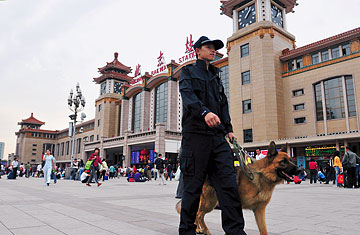
High alert
Police patrols at the Beijing Railway Station have been stepped up to monitor the city's visitors
The Jianguomenwai Diplomatic Residence Compound is a glum, Stalinist-style group of buildings constructed in the 1970s to house the first foreigners allowed to live in China after the turmoil of the Cultural Revolution ended. Although there are plenty of newer, swankier developments available, Jianguomenwai is still favored by some diplomats and journalists for its bargain rents and convenient proximity to an avenue leading to Tiananmen Square. But the apartments may be a little too close to the capital's most famous landmark. In late August, residents were notified by the compound's managers that, during the planned Oct. 1 parade marking the 60th anniversary of the founding of the People's Republic of China, they should refrain from opening "any window or balcony door" facing the parade route. Nor should they stand on the balcony to watch the procession. "When I asked them what would happen if we did go out on the balcony," one resident says, "in so many words they said we could get shot."
Beijing is always a strange place ahead of important occasions. In the weeks preceding recent Communist Party Congresses and last year's Olympics, the number of security forces on the streets doubled, controls on the Internet tightened, and dissidents and other potential troublemakers were rounded up or confined to their homes. But preparations and precautions for the 60th anniversary parade — when some 200,000 soldiers and a supporting cast of students and other civilians will march past a reviewing stand in Tiananmen Square — have far exceeded those undertaken for past events.
With the government's tolerance of opposition already at a low point, security forces have moved to shut down the few remaining dissenting voices. The rights of ordinary citizens to come to Beijing to seek redress for wrongs suffered in the provinces — a safety valve that Chinese have exercised for two millenniums — have been circumscribed to the point that trips to the capital by petitioners are virtually banned. Access to the Internet has been tightened to the highest level in memory. Even Twitter and Facebook are now blocked.
Meanwhile, elaborate rehearsals for the big day have paralyzed transportation in large areas of the capital. During the practice sessions, squads of SWAT police dressed in black body armor and balaclavas guarded major intersections. Residents of downtown Beijing were instructed not to emerge from their homes or attempt to witness the rehearsals, during which tanks and armored personnel carriers rumbled past the Prada and Gucci shops lining the capital's most famous thoroughfare, Chang'an Jie (Avenue of Eternal Peace).
In China, 60 years is traditionally one of the most important birthday celebrations. Beijing's top cadres are evidently determined to make the parade spectacular. The number of participants — ranging from legions of helmeted jet pilots to policewomen in white go-go boots to students waving colored placards — will be the largest ever. Military experts say that the amount of new hardware on display, including fighter jets and new models of ballistic and cruise missiles, promises to be unusual too.
But despite the celebratory aspects of this giant party, its hard not to be reminded of the vast, Orwellian machinery of control underlying the Party's rule. The specter of robotic ranks of soldiers marching past stone-faced leaders on the reviewing stand is an example of how Beijing often reveals an image of China that is completely at odds with the vision of a modern, peaceful nation the government is normally at pains to portray to the rest of the world. Such discrepancies probably matter little to those planning the anniversary parade. They know there is only one audience for this particular extravaganza: the Chinese people. And Beijingers don't seem concerned that their city has been turned into a high-security zone once again. "The rehearsal was a major headache, you couldn't get anywhere because of the traffic jams," says a chic woman in her early 30s. "But I think everybody understands. It's a very important day for the country, after all."
